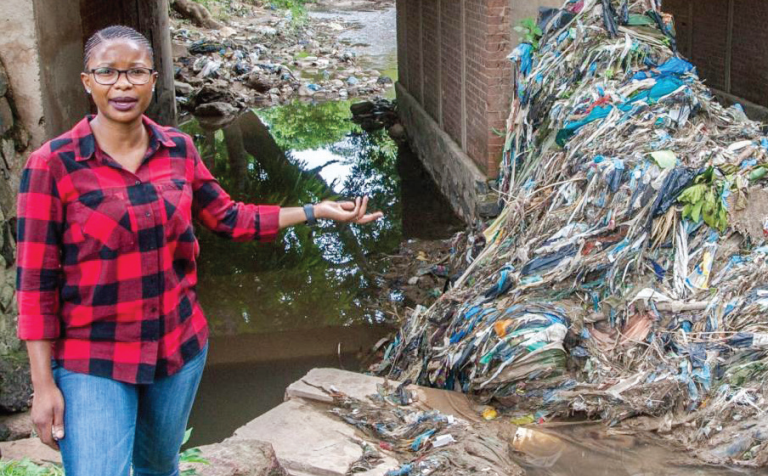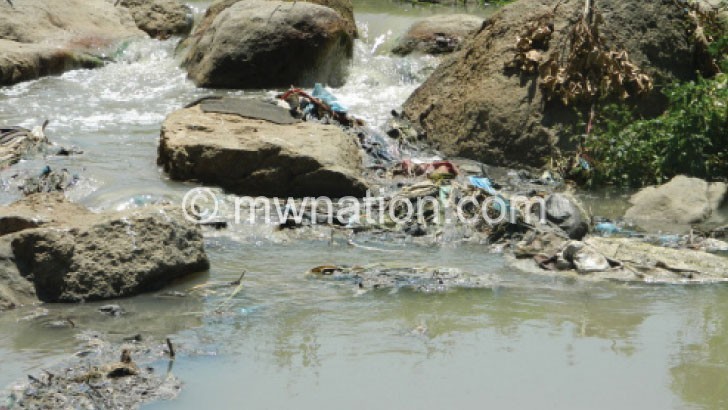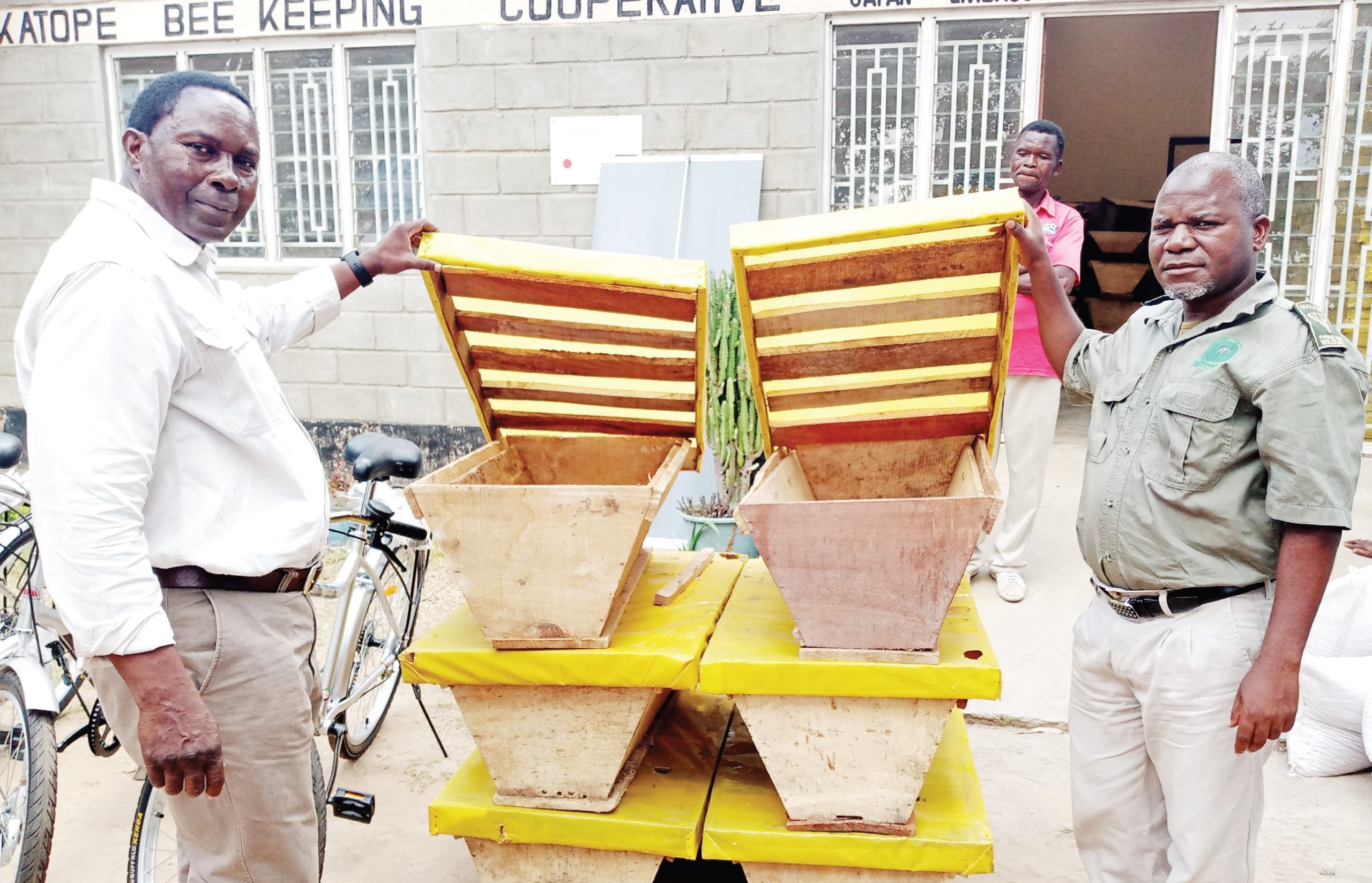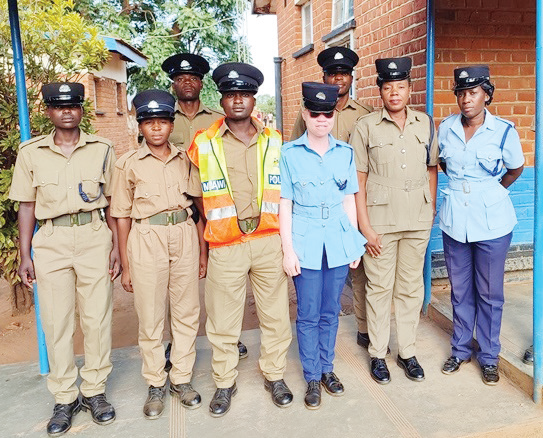Mudi clean-up wins Water Warriors Award
Monday to Sunday, water-wise Malawians pick waste from Mudi River in Blantyre.
The Mudi River Clean-Up campaigners do the dirty work with a smile to ensure everyone in Malawi’s largest commercial city lives and works in a clean and healthy environment.

“The dream is to turn Mudi into a tourist attraction,” says Manota Mphande. “We want to create a clean green business hub where people can come to study, rest, eat and relax.”
In 2018, the ebgineer co-founded the initiative with Gertrude Mlanga to collect waste from the river polluted by industrial discharges, broken sewage pipes and waste from houses on its banks.
Born in 1974, Mphande grew up in the cities of Blantyre, Lilongwe and Zomba, where rivers have become dumpsites for the fast-rising urban population.
To turn the tide, his team takes the garbage out, sorts it on a riverbank and churns out reusable products, including school bags.
The water stewardship initiative won the 2019 MBC Innovation Award, further endearing them to the river that splits Blantyre central business district.
Mphande explains: “As we pick trash, the water changes smell, colour and foam depending on the waste dumped in it.”
“Constantly, the team has to deal with this polluted water that smells of rotten meat, yogurt and industrial chemicals, which is hazardous to health.”

They collect no less than 200 kilogrammes of waste a day, he says.
Last year, a team of 100 collected 60 tonnes within 80 days from a 2.5km stretch, enough to fill two 40-foot shipping containers.
This gives a glimpse of the waste choking the tributary of Likhubula River, which pours into Shire River, the country’s largest river.
Mphande and his team are concerned about massive pollution because communities downstream use the filthy water for cooking meals, bathing and washing kitchen utensils.
“We want to keep the river clean and safe for everyone,” he states. “However, its smelly water is a reflection of our nation: we’ve many problems in our midst, but don’t want to clean up and create a safer environment for all.”
As his team clears waste, some onlookers ask: “Why do you bother?”
“This is symptomatic of the breakdown in water protection and sanitation,” Mphande states.
“It’s hypocritical,” he says. “When we wake up in our homes, we sweep our homesteads, but don’t care about the rivers in towns where we work or do business.”
Mphande originates from Nkhata Bay district along Lake Malawi, christened ‘Lake of Stars’ by Scottish missionary explorer David Livingstone. Having grown up away from the palm-fringed beachside locality, the avid swimmer frequents Africa’s third-largest freshwater lake.
However, he is concerned that the country’s topmost tourist destination is increasingly littered with single-use plastic bottles and carrier bags from polluted rivers.
“If pollution in urban rivers persists, the lake will lose its fresh water, fish and tourism potential,” he warns.
Mudi’s lost glory says it all. Four decades ago, the river’s clear waterflow was a hive of activity, including children’s leisure.
Looking back, Mphande laments: “I’ve always been water-wise, knowing water is life. I come from a lakeside village, so water is something I drink, feel and treasure every day.”
“Just in 1984, my peers and I used to swim and play in Mudi. Then there were abundant fish. Now there is no life: you don’t see fish, rats or snakes.”
He says Malawians have a choice to avert a looming crisis as busy towns and cities could become hotspots of preventable diseases if water pollution is not kept in check.
Restyling trash
In his tiny office downtown Blantyre, three tailors churn out school bags from recycled fabrics extracted from Mudi.
This year, they have produced about 250 bags, thanks to funding from the French Embassy in South Africa. The proud waste collectors donated some to children at Jacaranda School who participated in the clean-up and Mpingwe Primary School at the source of Mudi. Others were dispatched to Blantyre Girls and Ndirande primary schools in populous townships along the river.
“The clean-up involves mobilising the workforce, motivating them and figuring out what we can do with the trash. We want the children in Mudi catchment to see the amount of waste in the river and know they can do something to avert this environmental crisis,” Mphande says.
Mudi River Clean-Up team has won the Water Warriors Award. The annual award, sponsored by Water Witness courtesy of a loyal supporter, is presented to recognise, thank and inspire individuals and organisations worldwide working fearlessly, consistently and with conviction to improve water security for vulnerable communities.
The 2020 Water Warrior Award winners were farmers under Sukambizi Tea Association who conserves water for agriculture and household use in Mulanje.
Water Witness Malawi country lead Walter Chinangwa: “The passion of this year’s winners is rare but necessary. Their story shows that you do not always need a lot of money to do the right things, but it takes dedication and innovations by like-minded people.”
“It’s clear that upstream pollution impacting downstream communities has to be dealt with. There is a big opportunity to improve water quality in our rivers and water resources management in general.”
This calls for accountability to make water and environment management laws work, says Chinagwa.
“Everyone has a role to play, but duty-bearers—the local councils, National Water Resources Management Authority, Malawi Environmental Protection Agency and the Ministry of Water and Sanitation—need to be held accountable for not doing the right things to improve water management.”
Water Witness Deputy Director Dorcas Pratt, from Scotland, says the award-winning group is doing incredible work with limited resources.
She explains: “Their work is phenomenal considering that they are working in a situation where the pollution in these rivers is staggering, but, with limited resources, they are leading the way on what can be done.
“Certainly, they will need the support of government, the private sector and development partners. Private sector involvement is vital because some of the waste comes from industries and, of course, the government has a big responsibility to safeguard water for a sustainable future.”
In February 2022, Dorcas came face-to-face with Mphande’s team confronting water pollution in Blantyre. Knee deep in the filthy river, the group was seen pulling out tonnes of plastic and debris, “all threatening the lives of hundreds of thousands of people whose lives depend on the water from the river.”
Mphande says urban rivers would not be choked by garbage from upstream communities if Malawians were water-conscious from the household level to the policymaking table.
“We don’t seem to value clean water and a healthy environment,” he explains.
Malawi signed the Glasgow Declaration for Fair Water Footprint Declaration at COP26, the United Nations Climate Change Conference held in Scotland in November last year. The new deal promotes zero pollution, including holding businesses accountable that pollute water to maximise profits.
“We need to encourage everyone, including industries, that we should not only aim to have water, but also use it in a more sustainable manner and avoid pollution at all cost,” said then Minister of Natural Resources and Climate Change Nancy Tembo after signing the water stewardship pact in Glasgow.
Section 13 of the Malawi Constitution requires the government to implement progressive laws and policies that guarantee a clean and healthy living and working environment for all, including future generations. On July 28 this year, the UN General Assembly’s unanimous vote affirmed the right to a clean, healthy and sustainable environment.
However, the Ministry of Health reports that over half–52 percent–of outpatients seek treatment for diseases associated with unsafe water and poor sanitation.
“By turning rivers into dumpsites, we are turning cities into the birthplace of germs that cause diseases that are supposed to be history such as raging cholera. If we don’t keep rivers clean, the risk of such diseases are high because many people rely on the river, including the restaurants who use the contaminated water to wash plates and foodstuffs as well as downstream communities that use it for cooking meals and cleaning plates,”
Ajaba Pichesi, 67, has been selling tree, bamboo and flower seedlings along Mudi since 2003. From the waterfront, he has seen waste clogging Sunnyside Bridge near his leafy nursery for sale, where Mphande’s group heaped plastics, fabrics and debris that once blocked the river.
“As foot soldiers, we spent a month and a half removing the trash from the bridge. Thanks to teamwork, the river is a little cleaner and water can flow freely,” he says, supervising the waste pickers.
What motivates them?
“I’m convinced that we can make Mudi clean again if we work together to clean up and stop polluting in populous township upstream,” he explains.
Pichesi’s riverbank garden plays home to an ecotourism hub, where the team sorts waste for recycling and reuse. They erected two waterfront benches for the tourists they want to see along the river.
“In 2019, Mphande approached me, saying he wanted to mobilise his like-minded peers to clean up the river so we can live and work in a clean environment. I’m happy to work with him because clean water is about our well-being, our health, our children and their children.”
Mphande dedicates the Water Warriors Award to unsung heroes like Pichesi.
He explains: “We are happy to get the prestigious award in recognition for our small contribution, but more needs to be done to safeguard water.”
“More people, including government agencies and local councils, should play their role as do the teams that go into the river to pick assorted waste so we can have clean water. Our water warriors have embraced the river and they are playing their part mostly for a minimum wage.”
The Mudi River Clean-Up has created jobs for about 100 people, with one in 10 volunteering.
“I have done it on-off since 2018 without capital, so we have to put in a lot of sweat capital until we get sustainable capital and people learn to handle waste responsibly.” For Mphande, the ultimate goal is raising public awareness.
“We need a mindset change and buy-in. These words are used over and over in the corporate sector, but even corporates are not buying into the idea of sustainable business that cannot do without clean water and a healthy environment. They eagerly invest in short-term green initiatives for the sake of cameras, not a sustainable future.”






One Comment